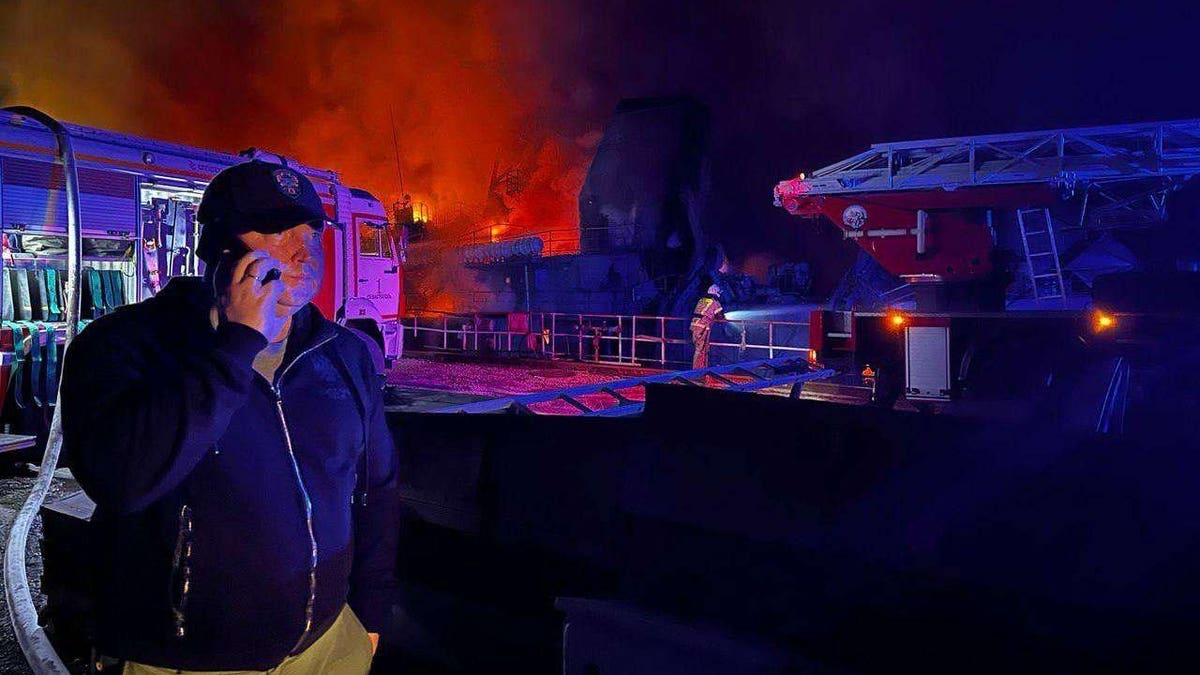We don’t know how Ukrainian forces struck the Russian naval base in Sevastopol, in Russian-occupied Crimea 150 miles south of the Ukraine front line.
Maybe they sneaked some of their explosives-laden drone vessels into the heavily-defended port. Maybe they fired a ballistic missile or a cruise missile. Maybe saboteurs sneaked into Sevastopol.
For the battered Russian Black Sea Fleet, how doesn’t really matter right now. What matters is fighting the fires raging across a drydock that exploded early Wednesday morning. A drydock that reportedly cradled two warships: a Ropucha-class amphibious vessel and a Kilo-class submarine.
If the Russians can’t put out the fires, and quickly, the Black Sea Fleet could lose two more of its roughly 30 large ships—ships it can’t replace until Russia’s wider war on Ukraine ends and Turkey reopens the Bosphorus Strait connecting the Black Sea to the Mediterranean Sea.
The Black Sea Fleet is having a very difficult war. A nighttime drone-boat attack on the landing ship Olenegorsky Gornyak in Novorossiysk, a port in southern Russia just 70 miles east of Russian-occupied Crimea, brought to four the number of major Black Sea Fleet warships the Ukrainian navy definitely has put out of action.
The losses include the landing ship Saratov, blasted by a ballistic missile in March 2022; the cruiser Moskva, holed by an anti-ship missile the following month; the rescue ship Vasily Bekh, another victim of an anti-ship missile; and then Olenegorsky Gornyak, which entered a drydock a few days after the Ukrainian attack—and may be out of the war, for good.
The Ukrainians also have sank or badly damaged several Russian patrol boats and landing craft—and also recently ejected Russian forces from a pair of captured Ukrainian oil platforms that the Russians had been using as naval outposts in the western Black Sea.
The sinkings and raids are a remarkable feat for a Ukrainian fleet that, after scuttling its sole frigate in the early hours of the Russian invasion in February 2022, apparently has just one large ship left: an aging landing ship that has been hiding out near the mouth of the Dnipro River and occasionally lobbing short-range rockets at Russian forces.
The Ukrainian navy now effectively is a shipless navy, but no less dangerous for its lack of large hulls. Between its locally-made Neptune anti-ship missiles and Western-made Harpoon ASMs, as well as its missile-armed TB-2 drones and one-way drone boats, the Ukrainian navy isn’t just holding the Russian Black Sea Fleet at bay, it actively is beating back the fleet.
Russian warships staging from Crimea are under constant assault; as of last month, ships in Russia proper are at risk, too. When Russian warships leave port, they do so briefly—usually only long enough to launch a few cruise missiles at Ukrainian cities.
The Russian fleet’s security is going to get worse before it gets better. The number and variety of deep-strike weapons with which Ukrainian forces can attack the fleet steadily are growing.
Ukrainian industry is developing a new thousand-mile cruise missile; and the administration of U.S. president Joe Biden reportedly has signaled it will donate to Ukraine Army Tactical Missile System ballistic rockets that range as far as 190 miles.
Either prospective new weapon could hit Sevastopol from the Ukrainian side of the front line. And the steady drumbeat of Ukrainian attacks on Russian ships is clear evidence that Ukrainian intelligence has no problem pinpointing the ships’ locations.
Read the full article here





